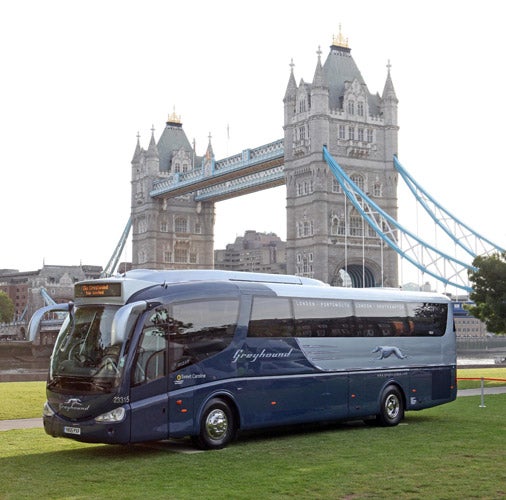Simon Calder: 'The dawg' is here. But will it win our hearts?

Your support helps us to tell the story
From reproductive rights to climate change to Big Tech, The Independent is on the ground when the story is developing. Whether it's investigating the financials of Elon Musk's pro-Trump PAC or producing our latest documentary, 'The A Word', which shines a light on the American women fighting for reproductive rights, we know how important it is to parse out the facts from the messaging.
At such a critical moment in US history, we need reporters on the ground. Your donation allows us to keep sending journalists to speak to both sides of the story.
The Independent is trusted by Americans across the entire political spectrum. And unlike many other quality news outlets, we choose not to lock Americans out of our reporting and analysis with paywalls. We believe quality journalism should be available to everyone, paid for by those who can afford it.
Your support makes all the difference."One pound, please." The proprietor of the café in Bulleid Way, above Victoria in central London, generously gave me the driver's discount rate for two coffees – one for me, and one for Lionel Marsh, coaching controller for Greyhound UK. He is organising the logistics for what the company hopes is the next great idea in British travel.
On this page three weeks ago, I was sceptical that the all-American concept of "riding the dawg" along Interstate highways could translate to the A3 and the M3 – the first two Greyhound UK routes run from Portsmouth and Southampton to London. So I asked if I could hitch a ride on one of the trial runs this week, which is why I am in the front seat of Peggy Sue, flagship of the Greyhound UK fleet.
This Southampton-bound bus left 20 minutes ago. It has taken us that long to reach Earl's Court Tube Station, a mere four stops on the Underground from Victoria. But soon afterwards the highway, in the shape of the A4, beckons. Forty minutes after leaving London we breeze past Heathrow Terminal 5 – not the most direct route to Southampton, but "there's roadworks in Richmond", as Lionel discovered on the way up. That is one advantage of buses – unlike trains, there are plenty of alternative routes available. And as we speed down the 10-lane stretch of the M25, counting down the distance at a steady mile a minute, I momentarily feel transported across the ocean to a country whose big cities are carved with rivers of traffic.
A sign warns "M3 J9-J11 Long Delays", but Lionel has judiciously chosen to join the Hampshire-bound motorway at Junction 12.
"Travel just got good" is the slogan of Greyhound UK. No question: it is quite the most comfortable bus I have been on. The seats are leather, and the legroom generous; during the upgrade from vehicles previously used for National Express routes, two rows of seats were taken out. For travel journalists and those with real jobs alike, mains electricity and free Wi-Fi is available. Bladder management is not an issue, since each bus has a loo at the back – next to the last three seats, which also boast legroom of business-class proportions.
How much does this premium trip cost? To echo the café owner in Victoria, "one pound, please" – and that even includes a copy of The Independent. As with any new enterprise, Greyhound UK is offering low fares to drum up business, and competitors are predictably striking back (see panel). Travel just got cheap.
One hour gone, and we have just emerged from a contra-flow at junction 14, somewhere outside Farnborough. The rival South West Trains service from London Waterloo is, at this stage of the journey, just past Winchester, only a quarter-hour from Southampton Central.
We still have 45 miles to roll, and Lionel has plenty to tell me about Greyhound's plans to take a bite out of the market between the capital and Hampshire's two big cities.
The company has a fleet of 11 newly refurbished vehicles and 26 newly recruited drivers. Starting on Monday morning, eight trips are planned each way on each route, scheduled to take a minute short of two hours to Portsmouth, and 15 minutes more to Southampton.
ppp "Welcome to Southampton, international maritime city", announces the sign at the roundabout on the outskirts. Two hours and two minutes after leaving London, Peggy Sue, Lionel and I arrive at Town Quay, beside the crumbling Watergate. All change for the Isle of Wight, or, indeed, the pub (alcohol being strictly banned on coaches).
I return by a heavily delayed train – the cause, a vehicle hitting a bridge near Clapham Junction. Road and rail just don't get on.
Hampshire fares battle begins
Travellers between Hampshire and London can look forward to a fares battle of Jutlandian proportions. In the naval tradition of spiking a rival's guns, the existing operator National Express has undercut Greyhound with a 99p "funfare". Anyone in a hurry to travel between Southampton and London will patronise the other big Scottish transport enterprise, Stagecoach, with its fast trains linking Waterloo with Southampton "Central" (a station that is anything but). The standard one-way fare is £31.70. Yet Stagecoach has a Megatrain offshoot that is offering £1 seats on a few trains on the route.
If that still does not provide enough choice, Southern Railway has another option from London Victoria: one train an hour departs during the day to Southampton, for an Advance fare of £5 – identical to the price to Purley, through which the train will whizz at 80mph within 20 minutes of leaving Victoria.
Join our commenting forum
Join thought-provoking conversations, follow other Independent readers and see their replies
Comments